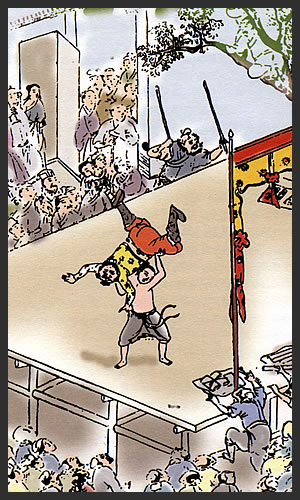Martial arts
Martial arts refer to various systems of training for combat that have been arranged or systematized. These arts are practiced for a variety of reasons including self-defense, military and law enforcement applications, mental and spiritual development, and cultural heritage.
History[edit | edit source]
Martial arts have a long history in various cultures. The earliest evidence of martial arts comes from Asia, particularly China, India, and Japan. In China, martial arts are often referred to as Kung Fu or Wushu. In India, ancient texts such as the Mahabharata and Ramayana mention martial arts techniques. Japan is known for its Samurai traditions and martial arts such as Judo, Karate, and Aikido.
Types of Martial Arts[edit | edit source]
Martial arts can be broadly categorized into traditional and modern styles. Traditional martial arts include:
- Karate - Originating from Okinawa, Japan, it focuses on striking techniques.
- Judo - A Japanese martial art that emphasizes throws and grappling.
- Taekwondo - A Korean martial art known for its high, fast kicks.
- Kung Fu - A Chinese martial art that includes a variety of styles and techniques.
Modern martial arts include:
- Mixed Martial Arts (MMA) - A full-contact combat sport that incorporates techniques from various martial arts.
- Brazilian Jiu-Jitsu (BJJ) - A martial art focusing on ground fighting and submission holds.
- Krav Maga - A martial art developed by the Israel Defense Forces for self-defense.
Training and Techniques[edit | edit source]
Training in martial arts typically involves learning techniques such as strikes, kicks, blocks, throws, and joint locks. Practitioners often train in forms or patterns known as kata in Japanese martial arts or taolu in Chinese martial arts. Sparring, or practice fighting, is also a common component of martial arts training.
Philosophy and Ethics[edit | edit source]
Many martial arts incorporate a philosophical or ethical component. For example, Bushido is the code of honor and morals developed by the Japanese samurai. Similarly, Taoism and Buddhism have influenced Chinese martial arts, emphasizing balance, harmony, and self-discipline.
Martial Arts in Popular Culture[edit | edit source]
Martial arts have had a significant impact on popular culture, particularly through martial arts films and video games. Notable martial artists such as Bruce Lee, Jackie Chan, and Jet Li have become international stars. Martial arts tournaments and competitions, such as the Ultimate Fighting Championship (UFC), have also gained widespread popularity.
Related Pages[edit | edit source]
- Karate
- Judo
- Taekwondo
- Kung Fu
- Mixed Martial Arts
- Brazilian Jiu-Jitsu
- Krav Maga
- Samurai
- Bushido
- Martial arts films
Categories[edit | edit source]
Search WikiMD
Ad.Tired of being Overweight? Try W8MD's physician weight loss program.
Semaglutide (Ozempic / Wegovy and Tirzepatide (Mounjaro / Zepbound) available.
Advertise on WikiMD
|
WikiMD's Wellness Encyclopedia |
| Let Food Be Thy Medicine Medicine Thy Food - Hippocrates |
Translate this page: - East Asian
中文,
日本,
한국어,
South Asian
हिन्दी,
தமிழ்,
తెలుగు,
Urdu,
ಕನ್ನಡ,
Southeast Asian
Indonesian,
Vietnamese,
Thai,
မြန်မာဘာသာ,
বাংলা
European
español,
Deutsch,
français,
Greek,
português do Brasil,
polski,
română,
русский,
Nederlands,
norsk,
svenska,
suomi,
Italian
Middle Eastern & African
عربى,
Turkish,
Persian,
Hebrew,
Afrikaans,
isiZulu,
Kiswahili,
Other
Bulgarian,
Hungarian,
Czech,
Swedish,
മലയാളം,
मराठी,
ਪੰਜਾਬੀ,
ગુજરાતી,
Portuguese,
Ukrainian
Medical Disclaimer: WikiMD is not a substitute for professional medical advice. The information on WikiMD is provided as an information resource only, may be incorrect, outdated or misleading, and is not to be used or relied on for any diagnostic or treatment purposes. Please consult your health care provider before making any healthcare decisions or for guidance about a specific medical condition. WikiMD expressly disclaims responsibility, and shall have no liability, for any damages, loss, injury, or liability whatsoever suffered as a result of your reliance on the information contained in this site. By visiting this site you agree to the foregoing terms and conditions, which may from time to time be changed or supplemented by WikiMD. If you do not agree to the foregoing terms and conditions, you should not enter or use this site. See full disclaimer.
Credits:Most images are courtesy of Wikimedia commons, and templates, categories Wikipedia, licensed under CC BY SA or similar.
Contributors: Prab R. Tumpati, MD






